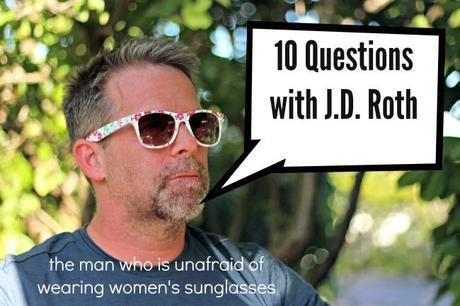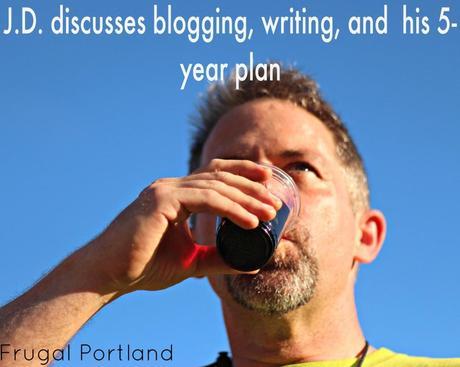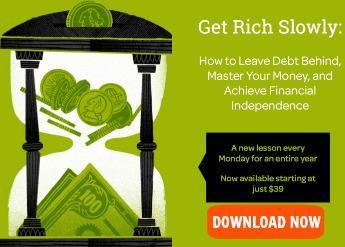You’re familiar with J.D. Roth. He’s the man who got rich quickly writing about how to get rich slowly. He’s my neighbor and friend, and a really cool guy. So when he told me about the book he was writing, I was thrilled. In fact, he let me read an advance copy a few weeks ago, and it’s great.
It launches today, and we sat down for lunch to talk about his latest project.

(those are my sunglasses, not his)
Note: some of the links below are affiliate links, which in general make your hair shinier and your skin glowier. It also means if you buy the guide through my link, I get a bit of money (but it won’t cost you extra). Win-win!
What’s the project?
I was asked to write an unconventional guide about money. What did I want to write about? Financial independence? I thought I did, but no. I wanted to write something more basic, something more accessible for everyone. But you know, there are dozens of general personal finance guides out there, even one I wrote! Nothing appealed to me except a line I often use when introducing a financial concept, and that is “think about it in terms of your own business.” So I dug a little deeper. My own finances were a mess, but I was responsible for the finances at the box store, then later in my own computer consulting business, and those books looked great. I remembered that it wasn’t until I took the idea of being the CFO of my own life that I was able to get a hold of my finances. So I wrote the guide, and put together a year’s worth of emails. If you’ve been reading from the beginning, you’ll remember some of the breakthroughs, but now? This is the best of the best, it’s the distilled wisdom of everything I learned the hard way.
Who is it for? Who benefits the most from this guide and course?
This guide is geared toward the struggling. If you’re having a hard time making ends meet, if you feel like you don’t have control, this is the course for you. One of the things I always tell people is, “nobody cares more about your money than you,” and it’s true. Your spouse, friends, financial advisor, real estate agent, even your parents, see your finances through their own lens, which means they don’t have your best interests at heart. Only you do. Another thing to remember is that your financial situation may or may not be your fault, but that’s not the point. However you got here, you’re here now, and it is your responsibility to get out of debt and build wealth, or as I say in the guide, “turn a profit.”
How much does it cost?
The lowest price is $39, and that includes the weekly emails. There are additional features at higher price points, but if you want to get started, and you’re motivated to take the advice offered, the $39 guide is the one to pick up.
4. It seems like that price is a little high for your target audience. Do you think that people who would benefit the most should not be spending $39 on something online?
I see what you’re saying, but no. If you buy this guide, and you take even some of the advice offered within, you will absolutely see that money back in your wallet/bank account/investment portfolio. If you’re ready to hear this advice, get the guide. It comes with a year’s worth of emails that will help remind you once a week that you’re on the path toward a profitable year, and that should make you, the CFO of your own life, happy to hear.
Now let’s talk about blogging, writing, and what’s next.
For those of you outside the personal finance world (hi, Dad!), the elevator speech on J.D. goes like this: in 2004 he starts writing Get Rich Slowly, he builds a loyal group of readers, he starts blogging his way out of debt, and in 2008 he sells Get Rich Slowly for seven figures. I love talking to him about blogging, and I asked him some questions about his process.

If you could travel back in time to 2004, and you could tell the 2004 version of yourself that you’d be where you are today, would you believe it?
No. My life is nearly 100% different than it was ten years ago, except that I’m only living three miles from where I lived at the time. I wrote an article back then called “The Man I want to be” and the funny thing is, some of it came true. In fact, if you look at it, it’s about happiness, and the things I wanted either came true or became things I no longer wanted because a person changes so much in ten years.
Continuing on a time travel theme, let’s pretend you didn’t sell Get Rich Slowly. Where would you be now?
Hmm. Well, there are one of two likely scenarios. One, I kept writing with the same enthusiasm I had at the beginning. Honestly? I think I’d have more money in the bank right now if I’d done that. But the other, more likely scenario, is that I would have gotten burned out and let the site die. I was getting tired of writing about money, especially when I had more coming in than I was used to, and I think I would have let the site get to the point where it was generating some residual income, but not much.
I was recently asked this in the context of an interview, so I’ll pay the question forward. What makes you qualified to write about money? What makes anyone qualified to write about money?
That’s a great question. There are two schools of thought. A person is qualified to write about money if they have never made any mistakes, right? If they’ve always done the right thing, they’ve always made good choices with their money, they approach things logically, and suggest you do the same. Then there are the others. You know who I mean. The ones who have struggled with money. The ones who have been in debt, made terrible decisions, then changed their mind and worked really hard to overcome debt. I don’t have a finance background, but I do have a psychology degree, and if money were purely logical and not at all psychological, we’d all be rich. I write about happiness. Money is a tool that helps people get to that place (or not!). Look, I was in debt. I had $35,000 of debt and now I have money in the bank. I was down, I worked hard, and yes, I got lucky. The habits you need to build are the same whether you have debt or you have money in the bank. But they feel different when you have wealth. I get to take bigger risks, like this. I spent weeks writing the best guide I could write, and I know that’s a luxury most people can’t afford.
How do you feel about sponsored posts? These are the posts where a company comes up to you and says, “if you link to my site, I will pay you $x.”
I was never comfortable with them. I know people have made a lot of money accepting sponsored posts, but I was never one of them. I’m a writer, and I was never very good at the marketing part of it, and I didn’t want to be influenced by any company. In fact, I never even wrote about companies in an affiliate sense. I’d write a review about something, then I’d go see if there was an appropriate affiliate to link to.
It’s a fine line, you know? I’m willing to write about credit cards, so what’s the difference between me writing content organically and linking to it versus me writing content built around a specific link?
The difference was always enough to make me uncomfortable. In fact, I remember in the early days, a credit card company wanted all the members of a group I was in to write about their card. The deal was easy, and lucrative. I don’t remember exactly, but I think they were offering $20,000 to each of us if we wrote about their card. Even then, I couldn’t do it.
My readers trust me that my opinions are all my own. I’m a storyteller, and for me, the story doesn’t leave a place for sponsored content.
That’s not to say it can’t be done on someone else’s site. It just isn’t for me, and it never was.
You write in a really approachable way. In fact, your readers (me included) felt like we knew you before we ever met you in person. Does that make meeting people from the internet weird or scary in any way?
You know, it used to. I used to be really nervous and self conscious when people would email me and ask if we could meet for coffee. But now? I love it. I’ve met so many people from the internet. Many have turned into friends, and many more have turned into great people to network with. Everyone has a story. Everyone has multiple stories, really. Today I see myself as a conduit for networking. If I hear someone’s story, I’m instantly thinking of someone they could connect with. Let’s say I meet a friend of a friend from Japan and he tells me about his story. Then I might think, “oh! A friend in Cincinnati has a similar story! Let me connect the two of you!” and it’s great. Sure, you could have disproportionate information on me given the fact that I’ve been very open online (and I’ve been writing forever) but that doesn’t bother me in the same way it once did.
What’s next for J.D. Roth? I’ll phrase it in an awkward interview question way: where do you see yourself in five years?
That’s impossible to say! Five years is an eternity in this day and age. But I do know what’s next: more travel. I want to travel extensively through the US, stopping off in interesting places, meeting new people, hearing their stories. I see it as a long road trip.
Thanks J.D. for a fun lunch talk! Good luck with your project.


